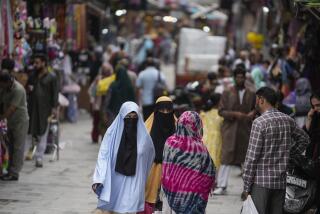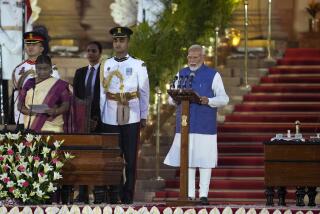India Parliament Dissolved, Forcing Vote : Politics: The election expected in May will be the second in only 18 months. There are fears that amid the instability in New Delhi, the balloting will spark violence.
- Share via
NEW DELHI — The shortest-lived Parliament in Indian history was dissolved Wednesday, forcing new elections for the second time in 18 months in what has become the most bitter and cynical political chapter in the world’s largest democracy.
President Ramaswami Venkataraman was forced to dissolve the Parliament, India’s most deeply divided ever, after Prime Minister Chandra Shekhar resigned last week, ending four months as head of a minority government that controlled just 54 seats in the 544-member Parliament.
Shekhar’s surprise resignation came amid charges that he had ordered undercover police to spy on former Prime Minister Rajiv Gandhi, who leads the coalition that kept Shekhar in power. Before long, the president began intensive efforts to persuade Gandhi, or any other Indian political leader, to try to form a new government.
But the attempts failed, and, in issuing Wednesday’s order, Venkataraman said a new Parliament would be convened by June 5. Later, India’s Election Commissioner T. N. Seshan told reporters that the voting would be held after May 15, and most Indian political observers predicted that the elections would be held May 24--during the hottest season of the year.
For days, Indian jurists, politicians and business leaders have been urging the president to find an alternative to fresh elections. One issue is the weather: During the hot season, the temperature routinely tops 115 degrees in India’s vote-rich northern Hindi belt. In addition, analysts said the advisers have told Venkataraman that elections would further damage India’s inflation-ridden economy and trigger new violence, in a nation where hundreds of deaths routinely accompany voting.
The president’s Wednesday announcement, however, was met largely with praise from the political leaders who had forced his hand, the same party leaders who now will be seeking to form a new majority at the polls.
Shekhar, a 64-year-old veteran Socialist who will continue as caretaker prime minister until the elections, called the president’s dissolution order “a step in the right direction.”
“The people must be careful before exercising their votes,” Shekhar told a press conference that some analysts viewed more as the opening of a campaign than the end of a premier’s term. “They must keep in mind those who sabotaged my government.”
In fact, in terms of arithmetic, Shekhar’s government was ill-fated from the start. Controlling just 10% of the seats in Parliament through a splinter group he created to help destroy the government that preceded his, the veteran dissident was able to form a government only with the backing of Gandhi’s Congress-I Party, which controlled about 200 seats.
Although it has been India’s largest party since the last national elections in November, 1989, Congress-I’s showing in that balloting was seen as a crushing personal defeat for Gandhi, the third generation of the Nehru family rulers who have used the party to run the nation for most of India’s 43 years of independence.
Gandhi, a former airline pilot, has refused the president’s invitations to form a government in the months since Shekhar’s predecessor, Vishwanath Pratap Singh, resigned last November after less than a year in power.
Signaling his own coming campaign strategy, Gandhi said the political crisis now facing the nation demonstrates the price India is paying for voting against Congress-I. “Anti-Congressism causes tremendous damage to the nation and is unable to run a government,” Gandhi was quoted as saying by the United News of India press agency.
More to Read
Sign up for Essential California
The most important California stories and recommendations in your inbox every morning.
You may occasionally receive promotional content from the Los Angeles Times.













